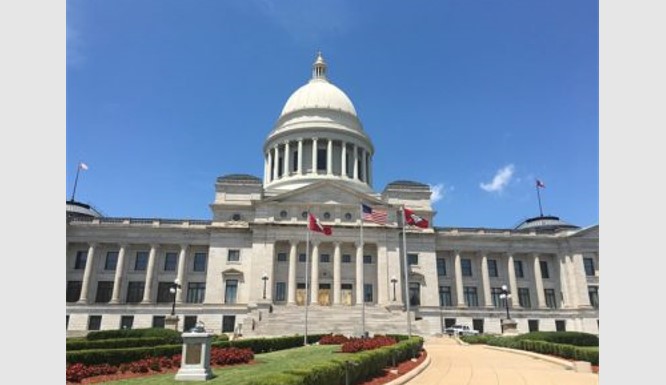
Arkansas House sends governor trans care malpractice bill
By ANDREW DeMILLO Associated Press
LITTLE ROCK, Ark. (AP) — The Arkansas House sent the GOP governor a bill Wednesday to make it easier to sue doctors who provide gender-affirming treatment to minors, moving to effectively reinstate the state’s blocked ban on such care.
The office of Gov. Sarah Huckabee Sanders said she backs the malpractice bill, which overwhelmingly passed the majority-Republican House on a mostly party-line vote.
“The governor has said that she supports bills that protect our kids and will support legislation like this that does just that,” spokeswoman Alexa Henning said in an email. “Only in the far-left’s woke vision of America is it not appropriate to protect children.”
The House-passed bill would allow anyone who received gender-affirming care as a minor to file a malpractice lawsuit against their doctor for up to 15 years after they turn 18. Under current Arkansas law, medical malpractice claims must be filed within two years of what the law refers to as an “injury.”
The proposal is the latest in a growing number of bills targeting transgender people, who also face increasingly hostile rhetoric at statehouses. At least 175 bills targeting trans people have been introduced in statehouses so far this year, the most in a single year, according to the Human Rights Campaign.
“Passing this bill says to one of our most vulnerable communities in the state that we don’t care about you,” Democratic Rep. Tippi McCullough, the House minority leader, said. “It says to trans kids that just because you’re different than us, you don’t deserve to be protected or cared for.”
The measure advanced as a federal judge is considering whether to strike down a state law he’s temporarily blocked that would prohibit doctors from providing gender-affirming hormone therapy or puberty blockers to anyone under 18 — or referring them to other doctors who can provide that care. No gender-affirming surgery is performed on minors in the state.
Health experts have said minors with gender dysphoria who do not receive appropriate care face dramatically increased risk of suicide and serious depression.
Legal experts said that Arkansas’ malpractice proposal, which other states are considering as part of broader bans on transgender care for children, would be a major change for how most malpractice claims are considered. By expanding the liability that doctors face for providing such care, the bill could make it nearly impossible for some providers to get malpractice insurance.
Opponents of the measure called the malpractice provision unconstitutional, saying it discriminates against transgender youth the same way Arkansas’ blocked ban did.
“It is exceedingly likely that the state will yet again lose a case involving our ongoing assault on this tiny, vulnerable group of kids,” Democratic Rep. Ashley Hudson said before the vote.
The House approved the bill on a 76-17 vote, largely along party lines, with one Republican lawmaker voting against the bill. Another GOP lawmaker voted present, which has the same effect as voting against the bill.
Republican Rep. Mary Bentley, House sponsor of the bill, said it “provides much-needed safeguards before life-altering medical treatment can begin.”
Other bills advancing through Arkansas’ Legislature include a bill that would criminalize transgender adults using a restroom that matches their gender identity if a minor is present.
Arkansas was the first state to enact a ban on gender-affirming care for children with its 2021 law, and several states since then have followed suit. Another ban in Alabama has also been blocked temporarily by a federal judge.
Nearly every major medical group, including the American Medical Association, has opposed such bans.
***
Arkansas Gov. Sanders signs bill creating school vouchers
By ANDREW DeMILLO Associated Press
LITTLE ROCK, Ark. (AP) — Arkansas Gov. Sarah Huckabee Sanders signed an education bill Wednesday that creates a new school voucher program, raises minimum teacher salaries, and places restrictions on classroom instruction on sexual orientation and gender identity.
The Republican governor and former White House press secretary, who took office in January, signed into law the 145-page measure that she’s called her priority in this year’s legislative session.
“We’ve seen how the status quo condemns Arkansans to a lifetime of poverty,” Sanders said in a signing ceremony in the state Capitol rotunda, surrounded by GOP lawmakers. “We’re tired of sitting at the bottom of national education rankings.”
Many details of how the legislation will be implemented have to be worked out in the coming months as officials write the rules for the voucher program and other aspects of the bill.
Over three years, the plan will phase in an “education freedom account” to pay for private- and home-schooling costs equal to 90% of the state’s per-student funding for public schools, which is currently $7,413. It’s part of a renewed push for such voucher programs following the COVID-19 pandemic that’s been fueled in part by fights over school curriculum.
The state Department of Education has projected that 7,000 students will participate in the program in its first year and 14,000 the following year.
Education Secretary Jacob Oliva said he planned to start to meet Friday with superintendents and school officials from across the state to get their input about how the rules for the voucher program and other aspects of the bill will be crafted.
“I’m already hitting the ground running,” Oliva told reporters after the bill was signed.
The voucher program was strongly opposed by Democrats and teachers’ groups who have said it will threaten support for public schools and widen disparities around the state.
“LEARNS creates a tiered system to give some students better advantages than others,” Democratic Sen. Greg Leding, the Senate’s minority leader, said in a statement after the signing.
Arkansas Education Association President Carol Fleming said schools face a great deal of uncertainty about their budgets and operations for the coming year without many of the details of the vouchers and other parts of the bill in place.
“How will school districts be able to set forth policies for the upcoming school year when we still don’t have the guidance and rules in place from the state Department of Education?” Fleming said.
The bill raises minimum teacher salaries by 39% to $50,000 and follows calls from both parties to raise starting pay from one of the lowest in the country. It also calls for every teacher to receive at least a $2,000 raise in the coming school year.
Opponents have criticized the bill for eliminating the state-mandated salary schedule that sets pay ranges based on education and years of service. Removing that mandate could penalize veteran teachers, opponents said. The legislation requires districts to set their own salary schedules.
The legislation also prohibits classroom instruction on gender identity and sexual orientation before fifth grade, similar to a Florida prohibition that critics have called the “Don’t Say Gay” law. It also puts into law an executive order Sanders signed in January on classroom instruction of critical race theory.
Critics of the restrictions say they create confusion for teachers on what topics are allowed and on just how far the prohibition goes. They’ve also said the restrictions on gender identity and sexual orientation marginalize LGBTQ people.
Oliva said the department planned to hold webinars and meetings with school officials about what that restriction entails, along with other parts of the legislation.
“We will definitely be providing technical assistance and guidance to make sure everybody understands what this bill means,” he said.
Associated Press
Have a news tip or event to promote? Email White River Now at news@whiterivernow.com. Be sure to like and follow us on Facebook and Twitter. And don’t forget to download the White River Now mobile app from the Google Play Store or the Apple App Store.
Get up-to-date local and regional news/weather every weekday morning and afternoon from the First Community Bank Newsroom on Arkansas 103.3 KWOZ. White River Now updates are also aired weekday mornings on 93 KZLE, Outlaw 106.5, and Your FM 99.5.











